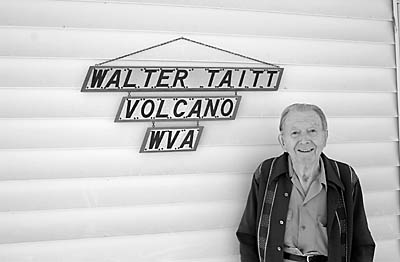"I'm the One Who Stayed"
Walter Taitt's 99 Years in Volcano
By Betty Leavengood

Walter Taitt, age 99, at his home in Volcano, Wood County. Photograph by Michael Keller.
Ninety-nine-year-old Walter Taitt has lived in the oil-boom town of Volcano, Wood County, all of his life. I remember Walter and his wife Frances from more than 50 years ago, when my friends and I rode our bicycles to Volcano to explore the remaining buildings and climb on top of the oil tanks. In those days, water bottles for bicycles were unknown, and we often stopped at people's houses for a drink. One of our favorite stops was at the white house near the bottom of the hill as you enter Volcano. Walter or Frances would bring us a pitcher of water and invite us to rest on their porch. They seemed happy to see a group of scrubby youngsters on bicycles.
Today, the buildings and tanks are gone. The road is paved, and only a scattering of houses remain. A passerby would never know that a town of nearly 5,000 people once thrived in this narrow valley.
In 1863, W.H. Moore drilled the first producing oil well in the vicinity of what is now Volcano. Further exploration soon led investors to believe that the area was rich in oil. In 1864, William Cooper Stiles, Jr., a wealthy Pennsylvanian who had been exploring the potential of the Volcano area, organized the Volcanic Oil & Coal Company with $1,000,000 in capital, and purchased 2,000 acres of what would turn out to be oil-rich land.
Stiles planned a community that, by 1870, was officially called Volcano. While many of the wealthy oilmen at the time moved into Parkersburg, Stiles established his home on a hill above town in Volcano. He called his estate Thornhill Farm and built an elegant 21-room mansion in the shape of a Maltese cross. It became the showplace of Volcano.
Volcano grew as people came to work in the oil fields and established business enterprises. At its peak, there were two hotels, Odd Fellows and Masonic lodges, a bowling alley, an opera house, several saloons, a sawmill, a barrel factory, a post office, a dozen stores, two schools, four churches, and hundreds of houses.
Tragedy struck in 1879, when a fire destroyed most of the buildings in Volcano. Stiles, unwilling to give up, rebuilt much of the town. Nature dealt another blow in 1884, though, when a windstorm destroyed more than 100 wooden oil derricks. Although Stiles remained in Volcano for the next decade, oil production never reached its pre-1880 levels. Finally, ill and discouraged, he decided to move to Parkersburg, but he died in his mansion on December 19, 1896, before he could make the move.
A year later, a devastating fire nearly destroyed Volcano once more. Although the town was never totally rebuilt, oil production resumed and was sufficient to keep Volcano going for another 60 years. By 1970, the wells were nearly depleted.
As I drove from Parkersburg to Volcano to see Walter for the first time in five decades, I marveled at how short the distance seemed to be to his house. Riding on our bikes on a gravel road, the trip had taken us several hours. I wondered, as we approached, if Walter would still come out on the porch, or whether he would be confined to a wheelchair. I was pleasantly surprised when Walter walked out on the porch to greet me. Walter has the look and step of a man much younger than his years. We toured the house and then sat down to talk about his life in Volcano.
"When Volcano was no longer active," Walter says, "many people bought the houses, tore them down, and moved them to a new location. I'm the one who stayed."
You can read the rest of this article in the Winter 2002 issue of Goldenseal, available in bookstores, libraries or direct from Goldenseal.